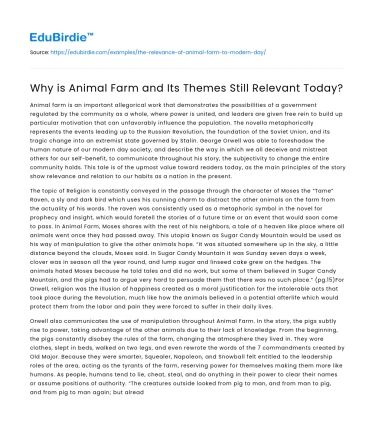Animal farm is an important allegorical work that demonstrates the possibilities of a government regulated by the community as a whole, where power is united, and leaders are given free rein to build up particular motivation that can unfavorably influence the population. The novella metaphorically represents the events leading up to the Russian Revolution, the foundation of the Soviet Union, and its tragic change into an extremist state governed by Stalin. George Orwell was able to foreshadow the human nature of our modern day society, and describe the way in which we all deceive and mistreat others for our self-benefit, to communicate throughout his story, the subjectivity to change the entire community holds. This tale is of the upmost value toward readers today, as the main principles of the story show relevance and relation to our habits as a nation in the present.
The topic of Religion is constantly conveyed in the passage through the character of Moses the “Tame” Raven, a sly and dark bird which uses his cunning charm to distract the other animals on the farm from the actuality of his words. The raven was consistently used as a metaphoric symbol in the novel for prophecy and insight, which would foretell the stories of a future time or an event that would soon come to pass. In Animal Farm, Moses shares with the rest of his neighbors, a tale of a heaven like place where all animals went once they had passed away. This utopia known as Sugar Candy Mountain would be used as his way of manipulation to give the other animals hope. “It was situated somewhere up in the sky, a little distance beyond the clouds, Moses said. In Sugar Candy Mountain it was Sunday seven days a week, clover was in season all the year round, and lump sugar and linseed cake grew on the hedges. The animals hated Moses because he told tales and did no work, but some of them believed in Sugar Candy Mountain, and the pigs had to argue very hard to persuade them that there was no such place.” (pg.15)For Orwell, religion was the illusion of happiness created as a moral justification for the intolerable acts that took place during the Revolution, much like how the animals believed in a potential afterlife which would protect them from the labor and pain they were forced to suffer in their daily lives.
Save your time!
We can take care of your essay
- Proper editing and formatting
- Free revision, title page, and bibliography
- Flexible prices and money-back guarantee
Orwell also communicates the use of manipulation throughout Animal Farm. In the story, the pigs subtly rise to power, taking advantage of the other animals due to their lack of knowledge. From the beginning, the pigs constantly disobey the rules of the farm, changing the atmosphere they lived in. They wore clothes, slept in beds, walked on two legs, and even rewrote the words of the 7 commandments created by Old Major. Because they were smarter, Squealer, Napoleon, and Snowball felt entitled to the leadership roles of the area, acting as the tyrants of the farm, reserving power for themselves making them more like humans. As people, humans tend to lie, cheat, steal, and do anything in their power to clear their names or assume positions of authority. “The creatures outside looked from pig to man, and from man to pig, and from pig to man again; but already it was impossible to tell which was which.”(pg.141)Like the apples and milk stored for the pigs, or the high rations of food taken away from the other “stupid” animals, the pigs always used their schemes of deception to change the way others viewed them.
In addition to this, Orwell develops the conversation of the corruption of power. When someone gains a position of authority that holds power, they tend to get carried away from time to time, changing their habits to adapt to a new lifestyle. George demonstrates this through Napoleon, one pig who ascended to the top, taking down anyone who stood in his way. Napoleon felt as if he deserved to constantly be in the spotlight, so he persuaded the other animals one by one to ditch their principles and morals of animalism, to convert to his side, under his rule. Napoleon slowly grew an army of “comrades” ready to stand and fight by his side. Before the rebellion, Napoleon swore he would always participate and work for the common good of the farm, but as the plot developed, he revealed his true colors, banishing the names of his former friends, changing the title of the farm, and creating a new set of laws to live by. “Napoleon was now never spoken of simply as “Napoleon”. He was always referred to in formal style as “our leader comrade Napoleon.”… It had become usual to give Napoleon the credit for every successful achievement and every stroke of good fortune.”(pg.93) As a result of his greed, selfishness, and longing for supremacy, Napoleon was not able break the unfortunate destiny toward the finish of the play that was his very own consequence doing. Power can change individuals into the thing or character that said they never would be. Supreme control changes individuals and makes something new and generally a beast.
Animal Farm shows key importance in the development of today’s modern day society as it gives a political and metaphorical standpoint on how people as a community act. It shows how humans are able to deceive and change their ways in order to get what they want. The novellas satirical storyline was able to use animals as a hidden message for the way in which we all manipulate others for our self enhancement.
Works Cited
- Orwell, George, Baker, Russell, Woodhouse, C.M. Animal Farm. New York, New York. New American Library. Penguin Group (USA). Copyright Harcourt Inc. 1946. First Signet Classics Printing March 1956.






 Stuck on your essay?
Stuck on your essay?

